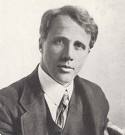| |
| NOTHING to say to all those marriages! |
|
| She had made three herself to three of his. |
|
| The score was even for them, three to three. |
|
| But come to die she found she cared so much: |
|
| She thought of children in a burial row; |
5 |
| Three children in a burial row were sad. |
|
| One man’s three women in a burial row— |
|
| Somehow made her impatient with the man. |
|
| And so she said to Laban, “You have done |
|
| A good deal right: don’t do the last thing wrong. |
10 |
| Don’t make me lie with those two other women.” |
|
| |
| Laban said, No, he would not make her lie |
|
| With any one but that she had a mind to. |
|
| If that was how she felt, of course, he said. |
|
| She went her way. But Laban having caught |
15 |
| This glimpse of lingering person in Eliza, |
|
| And anxious to make all he could of it |
|
| With something he remembered in himself, |
|
| Tried to think how he could exceed his promise, |
|
| And give good measure to the dead, though thankless. |
20 |
| If that was how she felt, he kept repeating. |
|
| His first thought under pressure was a grave |
|
| In a new boughten grave plot by herself, |
|
| Under he didn’t care how great a stone: |
|
| He’d sell a yoke of steers to pay for it. |
25 |
| |
| And weren’t there special cemetery flowers, |
|
| That once grief sets to growing, grief may rest: |
|
| The flowers will go on with grief awhile, |
|
| And no one seem neglecting or neglected? |
|
| A prudent grief will not despise such aids. |
30 |
| He thought of evergreen and everlasting. |
|
| And then he had a thought worth many of these. |
|
| Somewhere must be the grave of the young boy |
|
| Who married her for playmate more than helpmate, |
|
| And sometimes laughed at what it was between them |
35 |
| How would she like to sleep her last with him? |
|
| Where was his grave? Did Laban know his name? |
|
| |
| He found the grave a town or two away, |
|
| The headstone cut with John, Beloved Husband, |
|
| Beside it room reserved, the say a sister’s, |
40 |
| A never-married sister’s of that husband, |
|
| Whether Eliza would be welcome there. |
|
| The dead was bound to silence: ask the sister. |
|
| So Laban saw the sister, and, saying nothing |
|
| Of where Eliza wanted not to lie, |
45 |
| And who had thought to lay her with her first love, |
|
| Begged simply for the grave. The sister’s face |
|
| Fell all in wrinkles of responsibility. |
|
| She wanted to do right. She’d have to think. |
|
| |
| Laban was old and poor, yet seemed to care; |
50 |
| And she was old and poor—but she cared, too. |
|
| They sat. She cast one dull, old look at him, |
|
| Then turned him out to go on other errands |
|
| She said he might attend to in the village, |
|
| While she made up her mind how much she cared— |
55 |
| And how much Laban cared—and why he cared |
|
| (She made shrewd eyes to see where he came in). |
|
| |
| She’d looked Eliza up her second time, |
|
| A widow at her second husband’s grave, |
|
| And offered her a home to rest awhile. |
60 |
| Before she went the poor man’s widow’s way, |
|
| Housekeeping for the next man out of wedlock. |
|
| She and Eliza had been friends through all. |
|
| Who was she to judge marriage in a world |
|
| Whose Bible’s so confused up in marriage counsel? |
65 |
| The sister had not come across this Laban; |
|
| A decent product of life’s ironing-out; |
|
| She must not keep him waiting. Time would press |
|
| Between the death day and the funeral day. |
|
| So when she saw him coming in the street |
70 |
| She hurried her decision to be ready |
|
| To meet him with his answer at the door. |
|
| Laban had known about what it would be |
|
| From the way she had set her poor old mouth, |
|
| To do, as she had put it, what was right. |
75 |
| She gave it through the screen door closed between them |
|
| “No, not with John. There wouldn’t be no sense. |
|
| Eliza’s had too many other men.” |
|
| |
| Laban was forced to fall back on his plan |
|
| To buy Eliza a plot to lie alone in: |
80 |
| Which gives him for himself a choice of lots |
|
| When his time comes to die and settle down.
Harper’s Magazine |































